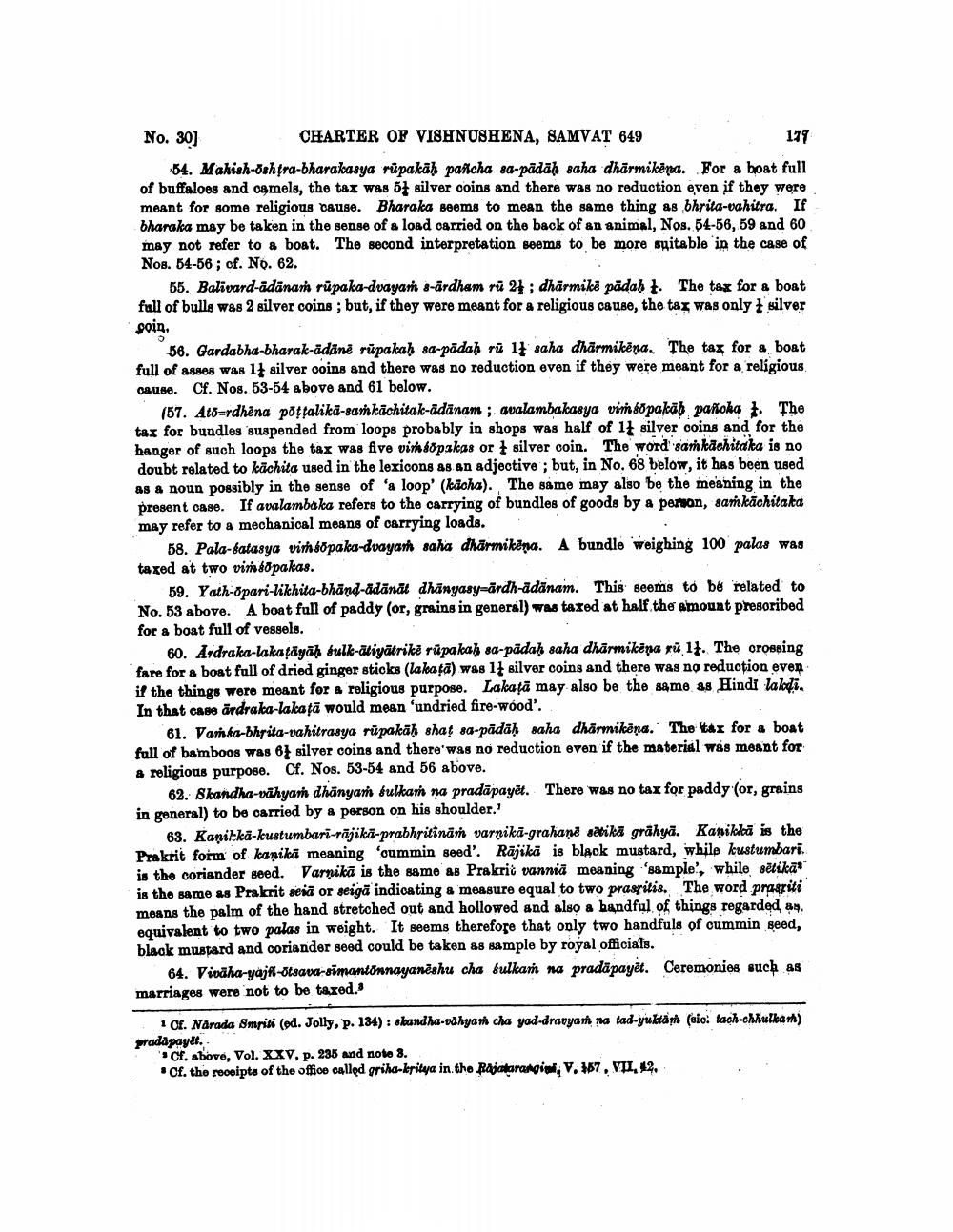________________
177
No. 30]
CHARTER OF VISHNUSHENA, SAMVAT 649 34. Mahish-Oshfra-bharakasya rupakäl paflicha sa-pädah saha dharmikëna. For a boat full of buffaloes and camels, the tax was 57 silver coins and there was no reduction even if they were meant for some religious cause. Bharaka seems to mean the same thing as bhrita-vahitra. If bharaka may be taken in the sense of a load carried on the back of an animal, Nos. 54-56, 59 and 60 may not refer to a boat. The second interpretation seems to be more suitable in the case of Nos. 54-56; cf. No. 62.
55. Balivard-adānan rüpaka-dvayam 3-årdham rů 21 ; dharmikë pädal t. The tax for a boat fall of bulls was 2 silver coins; but, if they were meant for a religious cause, the tax was only 1 silver soin,
56. Gardabha-bharak-ädänë rüpakah sa-pādah rů 11 saha dharmikëna. The tax for a boat full of asses was 14 silver coins and there was no reduction even if they were meant for a religious Cause. Cf. Nos. 53-54 above and 61 below.
(57. Ats=rdhëna potpalika-sankāchitak-ddanam ; svalambakasya vimeopakāb paftoka . The tax for bundles 'suspended from loops probably in shops was half of 13 silver coins and for the hanger of such loops the tax was five vith dopakas or silver coin. The word sankachitaka is no doubt related to kächita used in the lexicons as an adjective ; but, in No. 68 below, it has been used as a noun possibly in the sense of 'a loop' (kicha). The same may also be the meaning in the present case. If avalambaka refers to the carrying of bundles of goods by a person, sankāchitaka may refer to a mechanical means of carrying loads.
58. Pala-batasya vimbopaka-dvayarh saha dhārmikëna. A bundle weighing 100 palas was taxed at two vimeopakas.
59. Yath-Opari-likhita-bhand-idānät dhanyasy-ardh-adānam. This seems to be related to No. 53 above. A boat full of paddy (or, grains in general) was taxed at half the amount presoribed for a boat full of vessels.
60. Ardraka-lakatāyāḥ bulk-ātiyātrikë rūpakah sa-pädah saha dhārmikēna rů 17. The crossing fare for a boat full of dried ginger sticks (lakatā) was 14 silver coins and there was no reduction even it the things were meant for a religious purpose. Lakatā may also be the same as Hindi laki. In that case ärdraka-lakatā would mean 'undried fire-wood'.
61. Vamka-bhrita-vahitrasya rūpakah shat sa-pādah saha dharmikëna. The Wax for a boat full of bamboos was 67 silver coins and there'was no reduction even if the material was meant for a religious purpose. Cf. Nos. 53-54 and 56 above.
62. Skandha-vähyam dhanyaṁ sulkan na pradāpayet. There was no tax for paddy (or, grains in general) to be carried by a person on his shoulder.'
63. Kanil-ka-kustumbari-rājikā-prabhritināṁ varnikā-grahanë setika grāhya. Kanikkā is the Prakrit form of kanikā meaning 'cummin seed'. Rājikā is black mustard, while kustumbari. is the coriander seed. Varrika is the same as Prakrit vannid moaning sample, while sētika is the same as Prakrit sekä or seigā indicating & measure equal to two prassitis. The word praeriti means the palm of the hand stretched out and hollowed and also a handful of things regarded a equivalent to two palas in weight. It seems therefore that only two handfuls of cummin seed, black mustard and coriander seed could be taken as sample by royal officials.
64. Vivāha-yaja-otsava-simantonnayanèshu cha tulkam na pradāpayet. Ceremonies such as marriages were not to be taxed.
1 Cf. Närada Smriti (ed. Jolly, p. 134): skandha-odhyam cha yad-dradyan na tad-yuktär (sio: lach-chhulkar) prada paydi.
*Cf. above, Vol. XXV, p. 238 and note 8. Cf. the receipts of the office called griha-kritya in the Rajatarangimi, V. 167, VII, 42.




